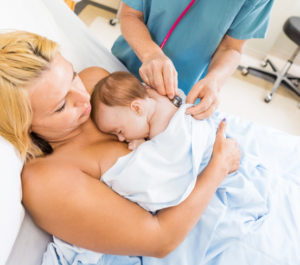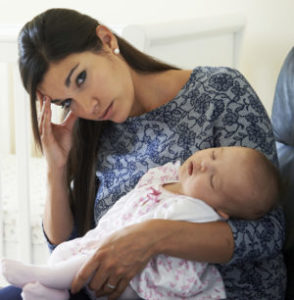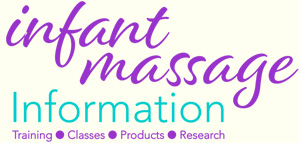There are many benefits to infant massage. While many advantages can be documented in research studies, there are many benefits (such as feeling closer to your baby) that are tricky to measure. Here is a look at some of the benefits that have been indicated by the limited research studies in this field.
Improved Sleep Patterns
- Infants experienced improved sleep immediately after being massaged (Argarwal et al., 2000).
- Low birth weight infants receiving massage exhibited better sleep patterns and greater alertness when awake (Kelmanson & Asulas, 2006).
- Infants who were massaged before bedtime adjusted to a more favorable rest-activity cycle by the age of 8 weeks and by 12 weeks produced more melatonin during the night (Goldstein Ferber, Laudon, Kuint, Weller, & Zisapel, 2002a).
- Infant massage by mothers has resulted in less irritability and fewer sleep problems in babies (Field, 2010).

Enhanced Development
- Massage on healthy, preterm infants showed a positive influence on brain and visual development (Guzzetta et al., 2009).
- Preterm infants receiving massage therapy gained more weight and slept less (Dieter, Field, Hernandez-Reif, Emory & Redzepi, 2003; Gonzalez et al., 2009).
- Massage therapy led to weight gain and increased bone density in preterm infants (Field, Diego & Hernandez-Reif, 2010).
- Massage combined with physical activity improved bone mineralization in premature infants (Aly et al., 2004).
- Low birth weight infants receiving parent administered massage had greater weight gain (Kelmanson & Adulas, 2006).
- Preterm infants who received massage therapy from mothers or trained professionals exhibited enhanced weight gain (Goldstein Ferber, Laudon, Kuint, Weller, & Zisapel 2002b).
Better Cost Effectiveness and Shorter Hospital Stays
- Preterm infants receiving parent-administered massage and usual nursery care had shorter hospital stays (Gonzalez et al., 2009).
- Very-low-birth-weight infants receiving mother administered massage were discharged from hospital an average of 7 days earlier (Mendes & Procianoy, 2008).

Improved Medical Outcomes for Infants
- Massage ameliorated jaundice in full-term newborns (Chen, Sadakata, Sekuzuka & Sayama, 2011).
- Increased serum insulin and IGF-1 levels followed massage therapy (Field et al., 2008).
- Vagal activity significantly increased during infant massage therapy (Field & Diego, 2008).
- Sleep apnea reduced in low birth weight infants receiving parent administered massage (Kelmanson & Adulas, 2006).
- Lower incident of late-onset sepsis in preterm neonates receiving mother administered massage (Mendes & Procianoy, 2008).
Safe for Medically Fragile Infants
- A parent-trained touch massage protocol for medically fragile infants in a level III neonatal intensive care unit was both feasible and safe. Babies remained physiologically stable and had no change in agitation/pain scores (Livingston et al., 2007).
- A greater increase in temperature was noted for pre-term infants receiving massage therapy even though incubator portholes remained open during the massage (Diego, Field & Hernandez- Reif, 2008).

Stress Reduction
- Massaged pre-term infants showed fewer stress behaviors and less activity during a five-day study (Hernandez-Reif, Diego & Field, 2007).
Reduction of Depression and Anxiety in Mothers
- Mothers of preterm infants had lower levels of depression and anxiety after massaging their infants (Feijo et al., 2006).
References
- Aly, H., Moustafa, M. F., Hassanein, S. M., Massaro, A. N., Amer, H. A. & Patel, K. (2004). Physical activity combined with massage improves bone mineralization in premature infants: A randomized trial. Journal of Perinatology, 24, 305–309. doi:10.1038/sj.jp.7211083
- Argarwal, K. N., Gupta, A., Pushkarna, R., Bhargava, S. K., Faridi, M. M., & Prabhu, M. K. (2000). Effect of massage & use of oil on growth, blood flow & sleep pattern in infants. Indian Journal of Medical Research, 112, 212-217.
- Chen, J., Sadakata, M., Ishida, M., Sekisuka, N. & Sayama, M. (2011). Baby massage ameliorates neonatal juandice in full-term newborn infants. Tohoku Journal of Experimental Medicine, 223 (2), 97-102. doi:10.1620/tjem.223.97
- Clarke, C. L., Gibb, C., Hart, J., & Davidson, A. (2002). Infant massage: Developing an evidence base for health visiting practice. Clinical Effectiveness in Nursing, 6, 121-128. doi:10.1016/S1361-9004(02)00089-4
- Cullen, C., Field, T., Escalona, A. & Hartshorn, K. (2000), Father-infant interactions are enhanced by massage therapy. Early Child Development and Care, 164, 41-47.
- Diego, M. A., Field, T. & Hernandez-Reif, M. (2008). Temperature increases in preterm infants during massage therapy. Infant Behavior and Development, 31, 149-52.
- Dieter, J. N., Field, T., Hernandez-Reif, M., Emory, E. K., & Redzepi, M. (2003). Stable preterm infants gain more weight and sleep less after five days of massage therapy. Journal of Pediatric Psychology, 28(6), 403-411. doi:10.1093/jpepsy/jsg030
- Feijo, L., Hernandez-Reif, M., Field, T., Burns, W., Valley-Gray, S. & Sinco, E. (2006). Mothers’ depressed mood and anxiety levels are reduced after massaging their preterm infants. Infant Behavior and Development, 29, 476-480. doi:10.1016/j.infbeh.2006.02.003
- Field, T. (2010). Postpartum depression effects on early interactions, parenting, and safety practices: A review. Infant Behavior and Development, 33(1), 1-6. doi:10.1016/j.infbeh.2009.10.005
- Field, T. & Diego, M. (2008). Vagal activity, early growth and emotional development. Infant Behaviorial Development, 31(3), 361-373. doi:10.1016/j.infbeh.2007.12.008
- Field, T., Deigo, M., & Hernandez-Reif, M. (2010). Preterm infant massage therapy research: A review. Infant Behavioral Development, 33(2), 115–124. doi:10.1016/j.infbeh.2009.12.004
- Field, T., Deigo, M., Hernandez-Reif, M., Dieter, J. N., Kumar, A. M., Schanberg, S. & Kuhn, C. (2008). Insulin and insulin-like growth factor (IGF-1) increased in preterm neonates. Journal of Developmental and Behavioral Pediatrics, 29(6), 463- 466. doi:10.1097/DBP.0b013e3181856d3b
- Goldstein Ferber, S., Feldman, R., Kohelet, D., Kuint, J., Dollberg, S., Arbel, E. & Weller, A. (2005). Massage therapy facilitates mother-infant interaction in premature infants. Infant Behavior & Development, 28, 74-81, doi:10.1016/j.infbeh.2004.07.004
- Goldstein Ferber, S., Kuint, J., Weller, A., Feldman, R., Dollberg, S., Arbel, W. & Kohelet, D. (2002a). Massage therapy by mothers and trained professionals enhances weight gain in preterm infants. Early Human Development, 67, 37-45.
- Goldstein Ferber, S., Laudon, M., Kuint, J., Weller, A., & Zisapel, N. (2002b). Massage therapy by mothers enhances the adjustment of circadian rhythms to the nocturnal period in full term infants. Journal of Developmental and Behavioral Pediatrics, 23 (6), 410-415.
- Gonzalez, A. P., Vasquez-Mensoza, G., Garcia-Veal, A., Guzman-Ramirez A., Salazar-Torres, M. & Romero-Gutierrez, G. (2009). Weight gain in preterm infants following parent-administered vimala massage: A randomized controlled trial. American Journal of Perinatology 26(4), 247-252. doi:10.1055/s-0028-1103151
- Guzzetta, A., Baldini, S., Bancale, A., Baroncelllli, L., Ciucci, F., Ghirri, P.,…Maffei, L. (2009). Massage accelerates brain development and the maturation of visual function. Journal of Neuroscience, 29(18), 6042-6051. doi:10.1523/jneuroscI.5548- 08.2009
- Hernandez-Reif, M., Diego, M. & Field, T. (2007). Preterm infants show reduced stress behaviors and activity after 5 days of massage therapy. Infant Behavior and Development, 30, 557-61. doi:10.1016/j.infbeh.2007.04.002
- Kelmanson, I. A. & Adulas, E. I. (2006). Massage therapy and sleep behavior in infants born with low birth weight. Complementary Therapies in Clinical Practice, 12, 200-205. doi:10.1016/j.ctcp.2005.11.007
- Livingston, K., Beider, S., Kant, A. J., Gallardo, C. C., Joseph, M. H., & Gold, J. I. (2007). Touch and massage for medically fragile infants. Evidence-Based Complementary and Alternative Medicine, 4, 473–482. doi:10.1093/ecam/nem076
- Magill-Evans, J., Harrison, M. J., Rempel, G. & Slater, L. (2006). Interventions with fathers of young children: Systematic literature review. Journal of Advanced Nursing, 55, 248-264. doi:10.1111/j.1365-2648.2006.03896.x
- Mendes, E. W. & Procianoy, R. S. (2008). Massage therapy reduces hospital stay and occurrence of late-onset sepsis in very preterm neonates. Journal of Perinatology, 28, 815-820. doi:10.1038/jp.2008.108
- O’Higgins, M., St. James Roberts, I., Glover, V. (2008). Postnatal depression and mother-infant outcomes after infant massage. Journal of Affective Disorders, 109, 189-192. doi:10.1016/j.jad.2007.10.027
- Onosawa, K., Glover, V., Adams, D., Modi, N., & Kumar, R. C. (2001). Infant massage improves mother-infant interaction for mothers with postnatal depression. Journal of Affective Disorders, 63, 201-207
